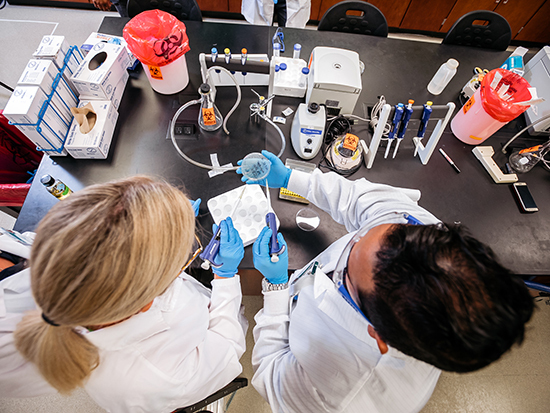Media contact: Adam Pope
 UAB’s School of Health Professions’ Master of Science in Biotechnology helps students develop and launch new products and technology, building a new future.
UAB’s School of Health Professions’ Master of Science in Biotechnology helps students develop and launch new products and technology, building a new future.
Photography: Andrea Mabry Discoveries in biotechnology have significantly improved the world in many ways. To sustain advancement of innovations within the biotechnology industry, it is crucial that the pool of highly skilled workers possess a growing passion and drive to positively impact lives. The University of Alabama at Birmingham School of Health Professions’ Master of Science in Biotechnology program prepares students to do just that by offering the tools needed to develop and launch new products and technology.
The master’s degree in biotechnology has a flexible design ideal for students working toward their unique professional goals, taking research from bench to bedside. The program provides a business-, research- and laboratory-based curriculum, which positions graduates at the forefront of biotechnology and life science research.
Tino Unlap, Ph.D., professor and program director of the UAB Department of Clinical and Diagnostic Sciences, says biotechnology is complex, has many applications and opportunities in this field are limitless. Many students of the master’s program begin doing lab work immediately after graduation or apply for terminal degrees such as medical, dental or Ph.D.
“Our goal with this program is to help make innovative ideas a reality,” Unlap said. “One of the unique aspects of this degree is that many of our students work in biotechnology or life science companies developing real-world solutions.”
Why biotechnology at UAB?
Discoveries in biotechnology have significantly improved the world in many ways — with the development of novel vaccines to curb pandemics, immunotherapies for cancer, environmental solutions and other modern breakthroughs.
In an entirely online program, students have the flexibility to complete their degree while working full time in just one year. Classes are divided into categories — principles of biotechnology, applications of biotechnology and bench to commercialization. Professional development is integrated throughout the coursework to train students in the necessary soft skills to excel in the business and lead advances in health care, biotechnology and other disciplines in science.
By partnering with various internship sites at UAB and beyond, students help develop new businesses and can gain experience in cancer research, biomedical engineering, genetics, clinical immunology, dentistry, health care, patient outcome analytics and more.
“My favorite aspect of the program is the lab experience and skills I am able to utilize and expand upon,” said Jaleesa DeJesus, a current biotechnology student. “We’ve been encouraged to apply the material learned in lecture to real-life situations, such as the COVID-19 pandemic.”
DeJesus currently works for Orgenesus, a leading regenerative medicine company that provides quality assurance for products through inspections and record-keeping.
“The online program at UAB allows me to work full time while also advancing my knowledge and career on my own time outside of work hours.”
Scope
The demand for qualified biotechnology workers is higher than ever, with the desire for new advancements in medicine, pharmaceuticals and genetics. The United States Bureau of Labor Statistics projects a 7 percent growth for employees within biotechnology, displaying a growing need in the workplace for employees specifically trained in this area.
The pandemic has widened the need for biotechnicians. Austin Rosser, a 2020 graduate of UAB, currently serves as a sales manager for Core Diagnostic Laboratories, a polymerase chain reaction specialty lab.
“PCR is becoming the golden standard in clinical diagnostics,” Rosser said. “The biotechnology program gave me the advantage of starting my career as an expert in the field.”
To learn more about a master’s degree in biotechnology, visit the program’s website.